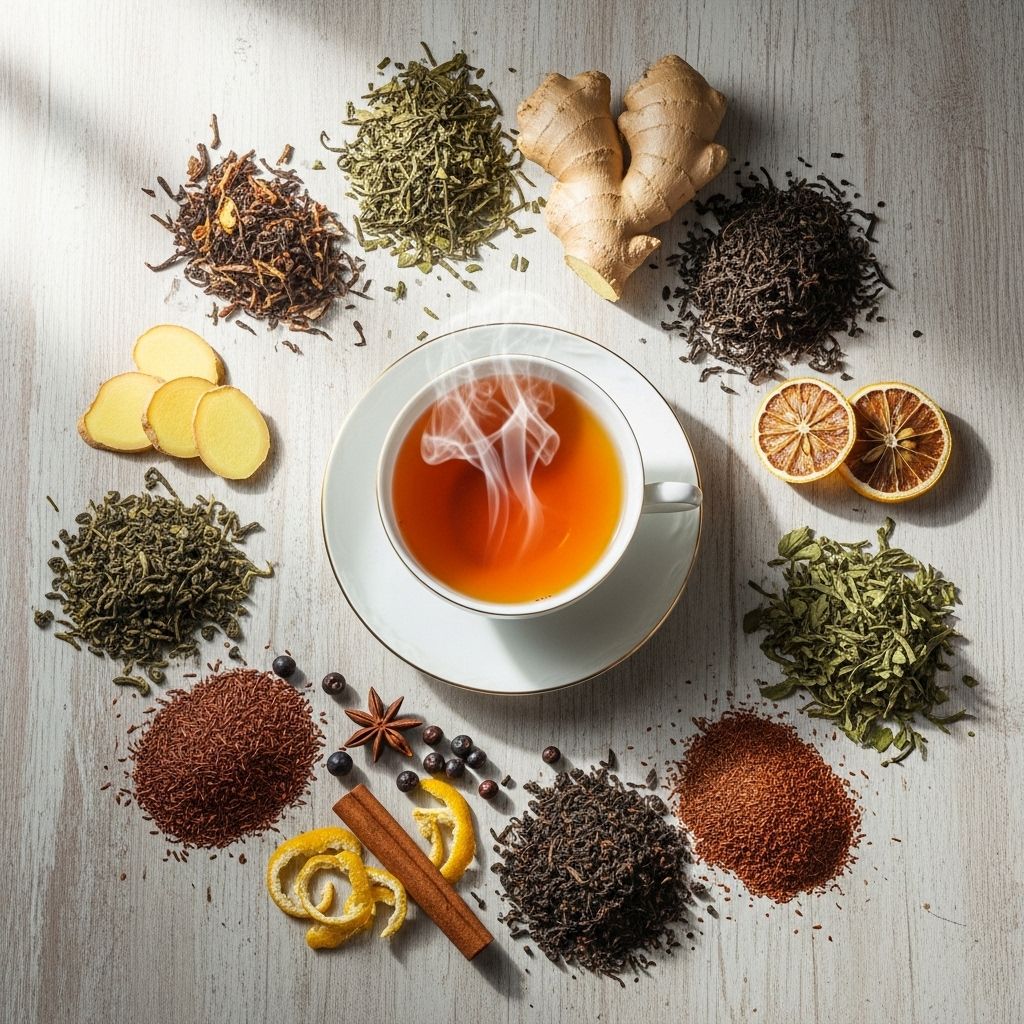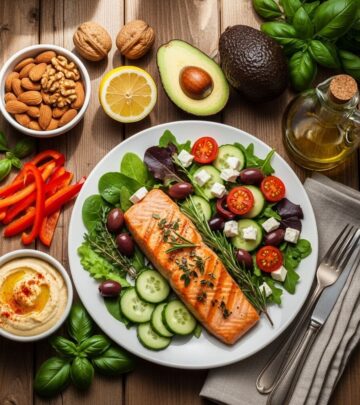The Best Teas for Visceral Fat Loss: Science-Backed Options
Discover the most effective teas for reducing visceral fat and learn how these beloved brews can support your health and weight management goals.

Visceral fat, the hidden abdominal fat surrounding your organs, is closely linked to increased risks of metabolic conditions, heart disease, and inflammation. Targeting visceral fat requires a comprehensive approach, including diet, exercise, and lifestyle changes. However, recent research suggests that certain teas offer natural compounds that may complement these efforts, potentially enhancing fat loss and improving overall health. This article explores the most effective teas for visceral fat loss, why they work, practical tips for incorporating them, and answers to common questions.
Understanding Visceral Fat and Why It Matters
Visceral fat refers to fat stored within the abdominal cavity, enveloping vital organs such as the liver, pancreas, and intestines. Unlike subcutaneous fat (the layer under your skin), visceral fat is metabolically active, contributing to increased inflammation, insulin resistance, and chronic disease. Reducing visceral fat not only slims your waistline but also dramatically lowers your risk for type 2 diabetes, cardiovascular disease, and other serious health problems.
- Visceral fat is harder to detect compared to subcutaneous fat.
- Excess visceral fat is associated with greater health risks, even in individuals with a normal body mass index (BMI).
- Effective strategies for visceral fat loss include diet quality, increased physical activity, stress management, and sufficient sleep.
How Tea May Help With Visceral Fat Loss
Certain teas contain bioactive compounds such as catechins, polyphenols, and caffeine, which can impact fat metabolism and overall body composition. While no beverage is a miracle solution, some teas have demonstrated the ability to increase fat oxidation, suppress appetite, and improve metabolic health in scientific studies. Let’s explore the most studied and effective options below.
Top Science-Backed Teas for Visceral Fat Loss
| Type of Tea | Key Fat Loss Compounds | Additional Benefits |
|---|---|---|
| Green Tea | High in catechins (especially EGCG) Contains caffeine | Antioxidant-rich, supports heart health, may boost metabolism |
| Oolong Tea | Polyphenols, moderate caffeine | May increase fat oxidation, enhances alertness |
| Black Tea | Flavones, polyphenols | Improves gut microbiota, can aid in weight management |
| White Tea | Catechins (comparable to green tea) | Minimally processed, delicate flavor, high in antioxidants |
| Peppermint Tea | Menthol, appetite-suppressing compounds | Supports digestion, reduces cravings |
1. Green Tea: The Classic Fat Burner
Green tea is widely recognized for its potent antioxidant profile, chiefly catechins such as epigallocatechin gallate (EGCG). These compounds have demonstrated the ability to increase energy expenditure, stimulate fat oxidation, and improve insulin sensitivity.
- A 2008 study found that obese individuals who drank green tea lost more weight and had greater reduction in body fat compared to non-drinkers over a 12-week period.
- A 2022 population study observed a 44% lower risk of abdominal obesity among people who drank four or more cups of green tea daily.
- When green tea consumption is combined with exercise, results in abdominal fat reduction are more pronounced.
- Matcha, a powdered green tea, offers a concentrated source of these beneficial catechins.
Green tea is best enjoyed plain, or with a squeeze of lemon for additional polyphenol absorption.
2. Oolong Tea: The Midday Metabolism Booster
Oolong tea is partially oxidized, placing it between green and black tea in both flavor and nutrient profile. Oolong is rich in polyphenols that enhance fat breakdown (lipolysis) and may promote greater energy expenditure.
- One animal study found that polyphenols in oolong tea helped significantly reduce visceral fat tissue.
- A 2020 human study showed oolong tea increased fat breakdown by approximately 20%, with effects carrying over into sleep hours.
- Oolong tea also helps bolster alertness and can aid in controlling blood sugar levels.
The aromatic, fruity profile of oolong makes it ideal for an afternoon boost, and it may help curb cravings for sweet snacks.
3. Black Tea: The Heart-Healthy Fat-Fighter
Black tea, fully oxidized and frequently enjoyed as chai or English breakfast tea, contains unique polyphenols called flavones. These compounds have shown anti-obesity effects and may aid in reducing visceral fat.
- A 2014 study found that drinking three cups of black tea daily for three months led to notable reductions in waist circumference compared to non-drinkers.
- Packed with flavonoids, black tea supports cardiovascular health and may contribute to a diversified, healthy gut microbiota.
- Black tea is robust, making it a good substitute for sugary beverages without sacrificing flavor.
4. White Tea: The Delicate Antioxidant Powerhouse
White tea is the least processed of all true teas. Its young leaves and buds are minimally handled, preserving delicate catechins linked to improved fat metabolism.
- White tea and green tea display comparable levels of fat-fighting catechins, particularly EGCG.
- In vitro (test tube) studies indicate white tea extract may boost the breakdown of existing fat and inhibit new fat cell formation.
- A recent 2023 review concluded that white tea can support both weight loss and a reduction in visceral fat, although more large-scale human studies are needed.
- White tea’s subtle, sweet flavor makes it an excellent choice for those who prefer a gentler taste.
5. Peppermint Tea: The Gentle Appetite Suppressant
Peppermint tea isn’t a true tea from the Camellia sinensis plant, but it offers unique benefits for weight loss efforts. Its aroma and menthol content have been shown to suppress appetite and assist digestion, potentially reducing total calorie intake.
- Peppermint tea may naturally curb hunger, aiding in weight management.
- It’s also caffeine-free, making it ideal for soothing evening routines and controlling late-night snacking.
- This tea soothes digestive discomfort, reduces bloating, and refreshes the palate.
How to Incorporate Fat-Loss Teas Into Your Routine
While specific teas may support fat loss through various mechanisms, the most important consideration is choosing those you enjoy and can drink consistently. Here are some evidence-informed tips for maximizing the benefits:
- Drink tea regularly—aim for two to four cups per day as studies indicate steady intake is associated with the best outcomes.
- Pair tea with healthy habits, such as a balanced diet, regular movement, stress management, and sufficient sleep. Tea should be part of your overall wellness plan.
- Don’t rely on tea alone for fat loss. Use it as a supplement to—not a substitute for—other science-backed approaches.
- Try various flavors and tea types to identify those you truly enjoy, which increases the likelihood of consistent consumption.
- Avoid adding large amounts of sugar or honey, which can counteract fat-loss benefits.
Potential Side Effects and Who Should Use Caution
While moderate tea consumption is generally safe for most adults, there are a few considerations to keep in mind:
- Caffeine sensitivity: Green, black, and oolong teas contain caffeine. Those sensitive to caffeine may experience insomnia, anxiety, or heart palpitations. Opt for decaffeinated versions or try herbal teas like peppermint if needed.
- Iron absorption: The polyphenols in tea can inhibit iron absorption from plant sources. Avoid drinking tea with iron-rich meals if you are prone to iron deficiency.
- Medication interactions: Some medications may interact with compounds in tea. Consult your healthcare provider if you take prescription drugs or have a medical condition.
- Pregnant and breastfeeding individuals should consult a healthcare provider regarding caffeine intake and safe herbal teas.
Sample Day: Tea Routine for Visceral Fat Support
- Morning: 1 cup of green tea (for metabolism and alertness)
- Midday: 1 cup of oolong tea (energy and fat oxidation boost)
- Afternoon: 1 cup of black tea (curb snack cravings and support gut health)
- Evening: 1 cup of white tea or peppermint tea (gentle, non-stimulating, soothes digestion)
Frequently Asked Questions (FAQs)
Q: Can drinking tea alone help me lose visceral fat?
No tea is a magic bullet for fat loss. Evidence shows that while regular consumption of certain teas can improve metabolism or support fat breakdown, results are best acquired when combined with proper nutrition, regular physical activity, adequate sleep, and effective stress management.
Q: How much tea should I drink for fat loss benefits?
Studies suggest that 2–4 cups per day of green tea, black tea, or oolong tea are sufficient for experiencing benefits. More is not always better—excessive consumption can have side effects, particularly from caffeine and tannins.
Q: Are herbal teas like peppermint as effective as green or oolong tea?
Herbal teas such as peppermint are helpful for appetite control and digestion but do not contain the same fat oxidation compounds found in Camellia sinensis teas. They can complement your fat loss strategy as part of an overall plan.
Q: Is matcha better than regular green tea?
Matcha contains a higher concentration of catechins and antioxidants because you consume the whole powdered leaf. While both are beneficial, matcha may deliver more robust effects per serving but is typically more expensive and potent in caffeine.
Q: How long does it take to see results from drinking tea?
Visible changes in body composition require consistency. In many published studies, participants consumed tea daily for 8–12 weeks before noticing measurable changes in weight or visceral fat. Sustainable habit changes always yield the best long-term results.
Key Takeaways
- Green, oolong, black, and white teas have shown the strongest evidence for supporting visceral fat loss through multiple mechanisms.
- Teas help by increasing fat oxidation, boosting metabolism, and potentially suppressing appetite.
- The greatest benefits come from drinking tea consistently as part of a broader healthy lifestyle, not as a standalone solution.
Always consult your healthcare provider before starting any new supplement or drastic dietary change, particularly if you have underlying health conditions or are taking medications.
Read full bio of medha deb












